Throwing off Fear: WSU Alumni
By: Katie England, Shaylee Stevens, Jaime Winston, Marketing & Communications
The following student stories are one part of our Throwing off Fear feature article. Scroll to the bottom of this page for links to our other sections.
Lessons from Anne Frank
Tela Faeamani BA ’19 hadn’t been in her classroom for long when all public schools went online.
After earning her English teaching degree, she began teaching seventh and eighth grade English at Mueller Park Junior High School in Bountiful in January 2020. Due to the COVID-19 pandemic, she had to make a quick pivot after getting started to move all six of her classes online.
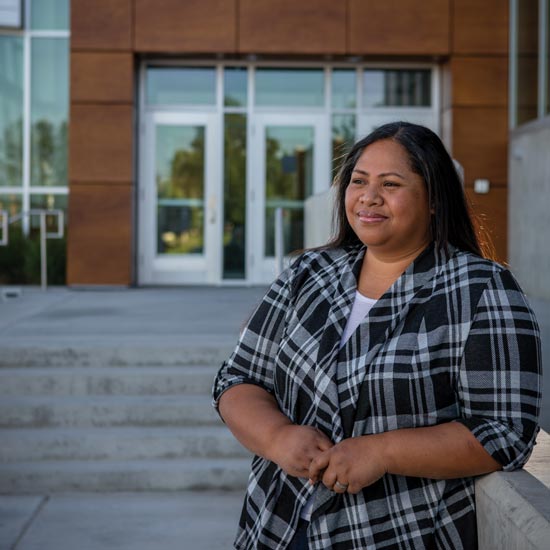 Since she had her course content backed up online already, Faeamani said going online was the easy part. Losing one-on-one interactions with students was another story.
Since she had her course content backed up online already, Faeamani said going online was the easy part. Losing one-on-one interactions with students was another story.
“That’s probably the hardest part of it for me, as a teacher, and for my students,” Faeamani said. “When I check in with them and see how they’re doing, or ask them to write something and tell me some of the things that they’re missing, not being at school, that’s probably the number one thing. They miss that face-to-face learning.” Along with learning in an actual classroom, students told her they miss their peers.
For many of her eighth graders, though, their isolation gave them a foundation to connect to their studies, specifically a stage adaptation of The Diary of Anne Frank.
Students drew connections between the quarantine and the isolation the Frank family and those with them experienced in the secret annex. “I’ve been able to have them personalize that story to what they’re going through,” Faeamani said.
While isolated, her students still saw her through Zoom sessions and weekly video lessons, while she gave them an option to complete their homework via video so she could see them.
Faeamani has five of her own children, four who completed schooling online last spring. She has also lost family due to the COVID-19 virus. She’s well aware of the toll adjusting to remote learning and the deadly pandemic has had on families.
“The best advice I can give other teachers, and even parents and kids, is to be patient with yourselves. It’s an adjustment for everybody that’s involved,” she said. “In the end, it’s going to be okay.”
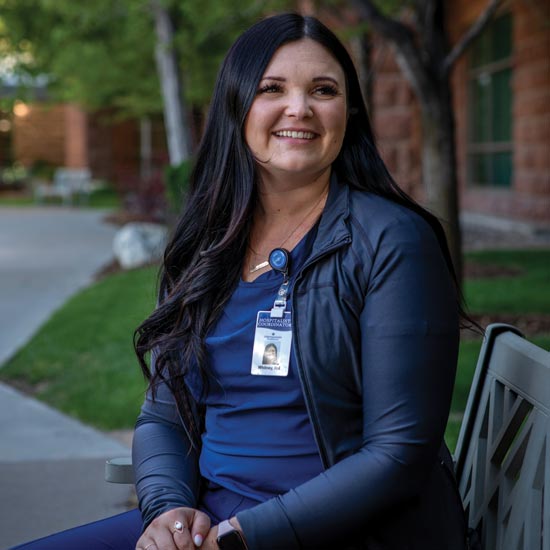 New York City Nurse
New York City Nurse
Whitney Hilton AS ’13 has always loved New York City. She was in sixth grade during the Sept. 11 terrorist attacks, and has since associated the city with American pride and unity.
After earning her associate’s degree in nursing at Weber State, Whitney went on to earn her bachelor’s degree online to become a registered nurse. She wanted to offer her nursing skills to respond to the COVID-19 pandemic in New York City, which was hit hard by the virus, but she wasn’t sure how to get off work for long enough.
When she heard that her employer, Intermountain Healthcare, was sending a team to New York City in April to assist healthcare workers responding to the virus, she knew she had to go.
Hilton found out on a Saturday that she had been accepted on the team, and was flying to New York by the next Tuesday for two weeks on the front lines of pandemic response. Because she has past critical care experience, she was placed in an intensive care unit at Long Island Jewish Medical Center.
The most rewarding part was getting to challenge herself by using her nursing skills under pressure, Whitney said. The hardest part was watching COVID-19 patients pass away alone.
“As nurses, you know you’re going to see death,” she said. “But no one really prepared me for the amount of death I was going to see.”
As she provided care, Hilton said she tried to look at patients from a family perspective.
“I’m going to hold [the patient’s] hand, even though I don’t know who he is, because he has family who hopes that’s happening,” she said. “If my dad was passing away, I would want someone to be there.”
After returning home from her two weeks in New York, Hilton said she doesn’t see herself as a hero — after all, she got to come home after only two weeks.
“The people of New York really are the heroes,” she said. “They are the ones with no end in sight. They are the ones who should be honored for what they’re doing.”
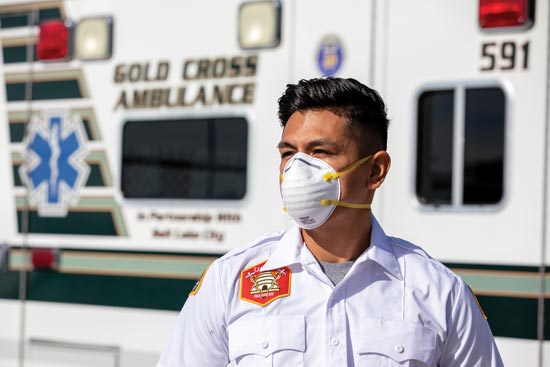 Extra Precautions
Extra Precautions
Luis Martinez BS ’20 works as a paramedic at Gold Cross Ambulance in Salt Lake City. A normal day would consist of transporting patients, often from hospital to hospital, and, typically, to higher levels of care. While he and his fellow paramedics have always made sure the ambulances were sterilized after each use, the COVID-19 pandemic took everything to another level.
Over the spring and summer, when he gets onto a shift, complete decontamination of the back of the ambulance is one of the first actions required, along with his typical med checkout, truck checkout and other normal preparations for the day. Even though the last crew to work in the ambulance decontaminated it after its last use, they can’t take any chances.
“The biggest thing is not knowing if the patient has it or not,” Martinez said. “So that’s always our biggest concern.”
Extra precautions are also taken while transporting patients. Specialized N95 masks and face shields are worn on every single call. After transporting a confirmed COVID-19 case, the decontamination processes are even more stringent. Along with the normal decontamination procedures, a fogging machine is used to distribute antibacterial cleaner throughout the back of the ambulance so no surface is missed. Then Martinez has to shower, switch uniforms and get back to the job.
While it does take more time out of each day, it’s worth it because that’s how they’re keeping patients safe, Martinez said.
While he does occasionally worry about the potential of spreading the disease to others, Martinez said he takes comfort in the precautions being taken, and he’s thankful for the fact that he doesn’t have to worry about where his next paycheck is coming from.
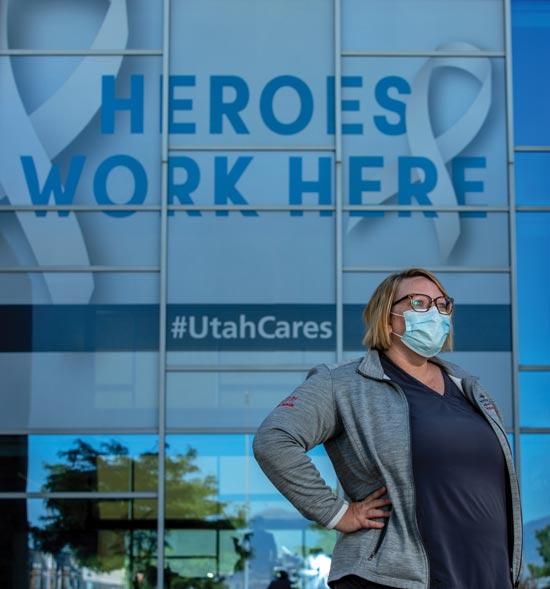 Front-line Radiologic Technologist
Front-line Radiologic Technologist
Libby Parr BS ’19 says that, in many ways, her job feels the same as it always has.
Originally graduating from Weber State with an associate’s in radiology in 2001, she’s closing in on 20 years in the field as a radiologic technologist. She loves the versatility of a normal day-to-day. Her job would normally take her all over the hospital on any given day, performing x-rays anywhere from the ER to surgery and beyond.
With the onset of the COVID-19 pandemic, however, a lot has changed.
COVID-19 requires chest x-rays along with the swab test, and more x-rays daily to follow symptoms and make sure the lungs are improving once someone has been diagnosed with the virus.
“A lot of times, people don’t realize how front-line radiology really is,” Parr said.
Intermountain Medical Center in Murray, where Parr works, has three COVID-19 units: one in the ER for those displaying COVID-19-like symptoms, one for COVID-19-positive patients who have been admitted, and one for COVID-19 patients who require intensive care.
Parr and the other radiologic technologists do four-hour shifts in these units — which may not sound long until you realize that even taking a sip of water requires taking off all the protective equipment, making functions like bathroom breaks nearly impossible.
By the time she gets off a four-hour stint in a COVID-19 isolation unit, her throat is dry from the air circulating inside her personal protective equipment, her lips are chapped and her eyes are dry.
Parr says through it all, morale with her coworkers has stayed high. People bring in donuts for each other, and family members drop off snacks for everyone.
“I see how tired my coworkers are,” she said. “It makes me grateful they’re getting gratitude and praise for what they do.”
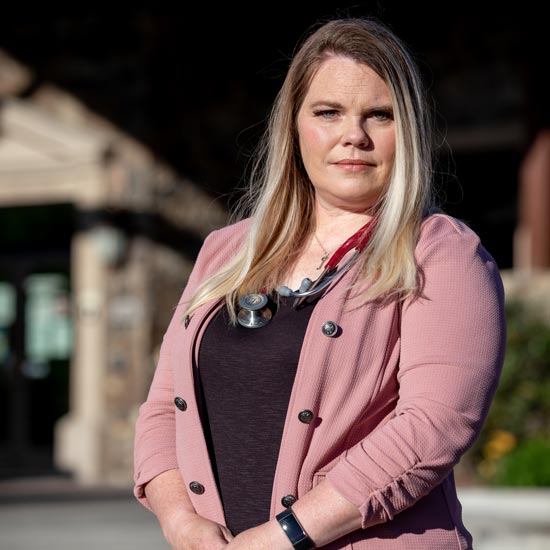 The Pandemic Changed Everything
The Pandemic Changed Everything
Kim Henne MA ’19 has witnessed both the best and worst aspects of working in healthcare during the COVID-19 pandemic.
As a Family Nurse Practitioner for Alteon Health, she has patients at multiple facilities in Utah and Salt Lake counties, and acts as a primary care provider for long-term patients.
Pre-pandemic, she made the rounds between facilities for new patient visits, follow ups and managing other care such as monitoring lab work or discharges.
The COVID-19 pandemic changed everything. To keep from transmitting the disease between facilities, all her services switched to virtual.
“I had to have a nurse take the computer around to the rooms, and the nurses had to be my eyes and ears for tasks like listening to stethoscopes,” Henne said. “I couldn’t do anything hands-on.”
Despite the many precautions taken, COVID-19 did make its way into one of the facilities where she works. She said she personally knew four people who passed away from the virus.
The hardest part about providing care for people with the virus was watching them struggle alone, because family wasn’t allowed in the facility.
“It’s hard on their mental health not having their families,” Henne said. “You see an increase in depression and anxiety in patients that families could temper.”
While it can be hard to keep everyone’s spirits up during such hard times, Henne said she’s witnessed silver linings as well. She’s been able to develop close relationships with patients, spending more time with each of them and getting to know them. She also feels more united with the other healthcare workers on her team.
Henne witnessed patients’ families going great lengths to spend time with them, from a child playing tic-tac-toe through a window with his grandmother, to a son who sat outside his mother’s window all day so she wouldn’t be alone.
“It’s so heartwarming to see how much love people have for one another,” she said.
Printing Masks
While the world faced one of the biggest challenges of the 21st century in the form of COVID-19, one Weber State alum shifted his business focus to provide vital personal protective equipment to the public.
Jerry Ropelato BS ’83 is the CEO of Whiteclouds 3D-printing company in Ogden, Utah. The company offers a wide array of products for clients, but their primary customers are companies that showcase products at trade shows. When the COVID-19 pandemic began, Ropelato’s regular customers were heavily impacted. Trade shows were canceled around the country, and there were very few orders to fulfill.
To keep his own company afloat, Ropelato started looking for new ideas to suit the changing market. When someone asked if he could 3D print personal protective equipment, Ropelato hit on the idea of creating face shields.
Whiteclouds has created more than 80,000 face shields since they began producing them in March. The face shields come in three different styles and are sold to individuals and businesses alike.
Unexpectedly, most customers purchasing the face shields have not been those working in medical professions. Instead, beauty salons, automotive shops, dentists and those in the food industry have been placing the majority of orders. The state of Utah also purchased 10,000 of the face shields.
To keep his employees at Whiteclouds safe, Ropelato encourages them to wear face shields, masks and gloves. In addition, work areas are regularly cleaned and sanitized. He plans to fabricate the shields as long as there is a need.
Other sections of our Throwing off Fear feature:
